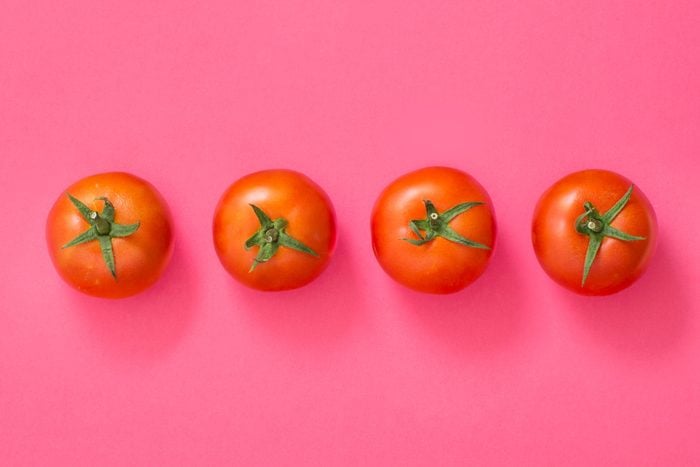Is Tomato a Fruit or a Vegetable?
Updated: Dec. 15, 2023

Turns out, there's both a botanical and a legal definition for what makes a food a fruit or a vegetable.
There’s no doubt that tomatoes are one of the most versatile foods around, as happy in a summer salad as they are in a comforting pizza sauce (big thank you to the person who invented pizza, by the way.) But is tomato a fruit? Or are we eating a vegetable? It’s one of those food facts people love to debate, like if eggplant is a fruit or vegetable, if cucumber is a fruit or vegetable, if avocado is a fruit or vegetable, and if peanuts are nuts.
There’s a tomato in every color and every preference. Cherry, beefsteak, heritage, sweet, or beautifully acidic, they’re all tomatoes, and they’re all delicious. As a bonus, they’re also one of the easiest vegetables to grow at home. Or is it easiest fruits? Learn about the purple dots on tomato leaves. Good tomatoes taste like sunshine, and that should be all we need to know. It turns out, though, that defining whether a food is a fruit or a vegetable isn’t as simple as it might seem.
What is the difference between a fruit and a vegetable?
Before we get into the whole “is tomato a fruit” debate, let’s define what fruits and vegetables are. According to Merriam-Webster, fruits are “the usually edible reproductive body of a seed plant, especially: one having a sweet pulp.” Fun fact: The smallest fruit in the world is the size of an ant!
Merriam-Webster defines a vegetable as “a usually herbaceous plant grown for an edible part that is usually eaten as part of a meal.” This means that the vegetable category includes all plant parts, like roots, leaves, and stems. Fruit, on the other hand, is only the seed-carrying part of the plant. So things like beets, spinach, and broccoli are all vegetables, and are best eaten when they’re in season (find a guide here!)
Is tomato a fruit or a vegetable?
Farmers, chefs, and lawyers all have different answers to this question. It may seem simple to us. Eat it for lunch? Vegetable. Eat it for dessert? Fruit! But it’s not that easy. There are legal definitions of fruits and vegetables, as well as scientific ones. Tomatoes fit the scientific definition of fruit as they form from a flower and contain seeds. So botanically, tomatoes are fruit. However, the way we eat them and treat them in cooking means that they also fall into the legal category of vegetables.
Why are tomatoes fruit?
The actual tomato plant is a seed plant that grows the red, edible tomatoes people know and love. Although tomatoes aren’t known for being as sweet as other fruit (like peaches), they’re not as bitter as some vegetables (looking at you, Brussels sprouts). With this definition in mind, everything from peppers to cucumbers are also fruit, while carrots and potatoes are not. It’s an interesting fact that potatoes are actually distant relatives of the tomato. However, as root vegetables, they don’t fit the “fruit of the vine” definition that makes tomatoes a fruit.
Which type of fruit is a tomato? Technically, it’s a berry, which is defined by Brittanica as a “fleshy fruit that usually has many seeds.”
Why are tomatoes vegetables?
While tomatoes are scientifically fruits, they’re legally classed as vegetables. From the definitions previously mentioned, it might seem like tomatoes are unequivocally not vegetables. So, is tomato a fruit then? Not exactly.
In 1893, Congress passed a tariff act putting a 10 percent tax on whole vegetables. So, to avoid paying the fee, merchants claimed that tomatoes are fruit. A decision made by the Supreme Court for the case stated that tomatoes should be classified as a vegetable instead of a fruit for the “purposes of trade and commerce,” since chefs prepare them and people eat them like vegetables. This means, legally speaking, tomatoes are vegetables.
Tomatoes are fruits and vegetables
Is tomato a fruit? Is tomato a vegetable? The simple answer: it’s both a fruit and a vegetable. No matter what you call it, a tomato is a great food to include in your diet since it contains essential fiber, vitamins, nutrients, and antioxidants. You should eat them regularly alongside all your other favorite fruits and vegetables.
When it comes down to a tomato’s exact categorization, it doesn’t really matter. After all, there’s a reason that the World Health Organization recommends that all humans eat a minimum of five portions of fruits and vegetables per day. They’re equally beneficial, and equally necessary for our bodies to function. Whether you like tomato salad or prefer tomato soup, eating this fruit/vegetable will do you good.
Now, do you know the difference between stock and broth?
Sources:
- Merriam-Webster: “Fruit,” “Vegetable”
- Brittanica: “Berry”
- Smithsonian Magazine: “Tomatoes Have Legally Been Vegetables Since 1893”
- Advances in Nutrition: “Health Benefits of Fruits and Vegetables”
